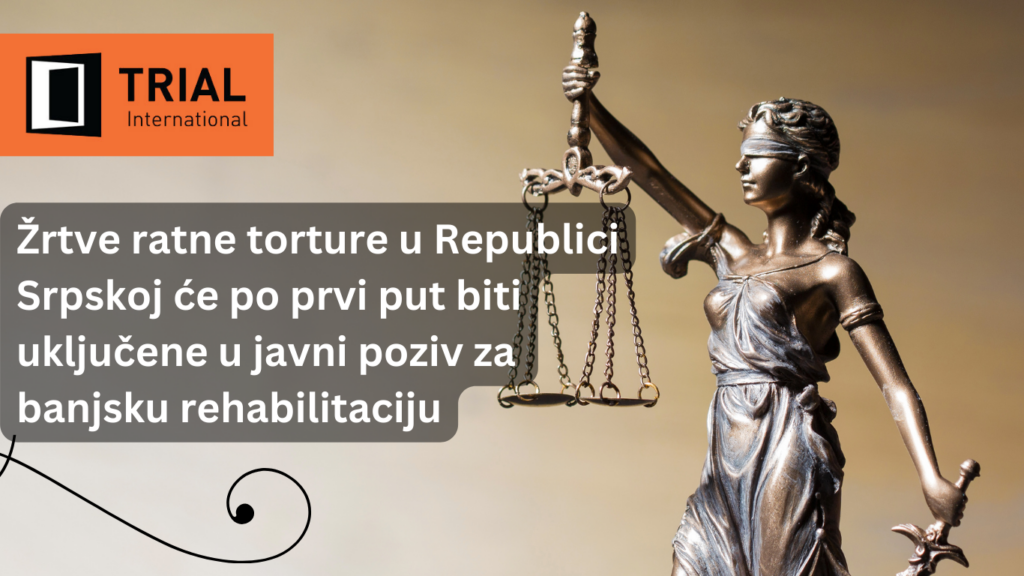Žrtve ratne torture u Republici Srpskoj će po prvi put biti uključene u javni poziv za banjsku rehabilitaciju

Organizacije TRIAL International, Fondacija „Udružene žene“ i Fondacija „Lara“ pozdravljaju Odluku Vlade Republike Srpske kojom je data saglasnost za raspisivanje Projekta banjske rehabilitacije za ratne vojne invalide, članove porodica poginulih boraca Odbrambeno – otadžbinskog rata i, po prvi put, žrtve ratne torture u Republici Srpskoj. Iako Zakon o zaštiti žrtava ratne torture predviđa ovo pravo za pojedince sa ostvarenim statusom, nijedan do sada raspisani javni poziv nije uključivao ovu kategoriju.
Raspisivanje javnog poziva rezultat je zalaganja TRIAL International-a i partnerskih organizacija, Fondacije „Udružene žene“ i Fondacije „Lara“, kao i rada predstavnika institucija i međunarodnih organizacija. Evropska unija je bila aktivni zagovarač implementacije ovog prava kao jednog u nizu koraka koje vlasti trebaju poduzeti kako bi obezbijedili realizaciju ključnog prioriteta u procesu evropskih integracija koji se odnosi unapređenje okruženja pogodnog za pomirenje a sve u cilju obezbjeđivanja reparativnih mjera za žrtve ratnih zločina.
Adrijana Hanušić Bećirović, viša pravna savjetnica organizacije TRIAL International, pozdravila je ovaj veoma značajan iskorak za osobe sa priznatim statusom žrtve ratne torture u Republici Srpskoj, prvenstveno preživjele ratnog silovanja. „Prije tri godine, žrtve su u razgovorima s nama i drugim pružateljima podrške počele sve intenzivnije artikulisati potrebu za banjskom rehabilitacijom, obzirom na to da višestruke posljedice koje već decenijama trpe zbog pretrpljene torture starenjem postaju sve izraženije. Republika Srpska je na ovaj način učinila značajan iskorak u regionu, te se nadamo da će i Federacija BiH koja je ovo pravo, u odgovoru na naše zahtjeve, predvidjela u nedavno usvojenom zakonu, bez odlaganja osigurati implementaciju u praksi i za civilne žrtve rata u Federaciji BiH.“
Ministarstvo boračko-invalidske zaštite Republike Srpske je za Projekat banjske rehabilitacije ove godine izdvojilo 500,000 КМ. Gorica Ivić, izvršna direktorica Fondacije „Udružene žene“ iz Banja Luke pohvalila je ovu odluku: „Nadamo se da će žrtve imati priliku da kontinuirano koriste ovo pravo bez dodatnih administrativnih prepreka te da će status biti dovoljan osnov za korištenje rehabilitacije u zdravstvenim ustanovama koje pored medicinskih usluga nude i i psihosocijalnu podršku od strane stručnih lica koji su senzibilisani za trauma orijentisan rad.“
Potreba za banjskom rehabilitacijom za žrtve ratne torture naglašena je i na nedavno održanim događajima u Banjoj Luci i Bijeljini, prilikom kojih je predstavljena i Analiza „Izazovi u implementaciji Zakona o zaštiti žrtava ratne torture Republike Srpske“. Zagovaranje za unaprijeđenje implementacije aktivno je počelo inicijativom TRIAL International-a i partnerskih organizacija još u oktobru 2022. godine. Pored banjske rehabilitacije, inicijativa se fokusirala i na produženje ili ukidanje roka za sticanje statusa žrtve ratne torture.
Radmila Žigić iz Fondacije „Lara“ takođe je pozdravila odluku Vlade RS: “Nadamo se da će pristup pravimo da se ostvaruje bez komplikovanih administrativnih procedura. Takođe, nismo još
izgubili vjeru da će naša zakonodavna i izvršna vlast prepoznati potrebu da se produži rok za podnošenje zahtjeva za ostvarivanje statusa i prava za brojne žrtve ratnog seksualnog nasilja i drugih oblika torture koje ova prava još nisu tražile i očekujemo da će izmjene Zakona o zaštiti žrtava ratne torture ući u agendu rada vlasti u Republici Srpskoj u 2024. godini.”
Aktivnosti ka adresiranju ovih važnih potreba za preživjele podržala je Vlada Ujedinjenog Kraljevstva.
